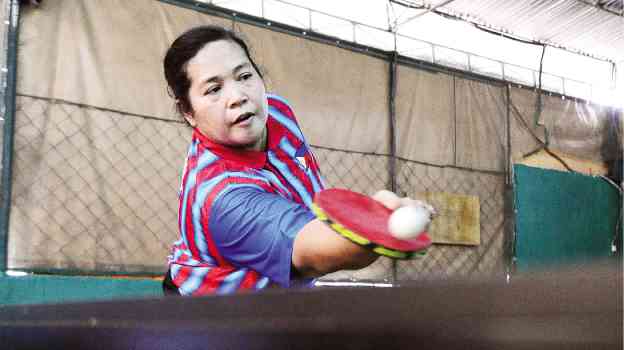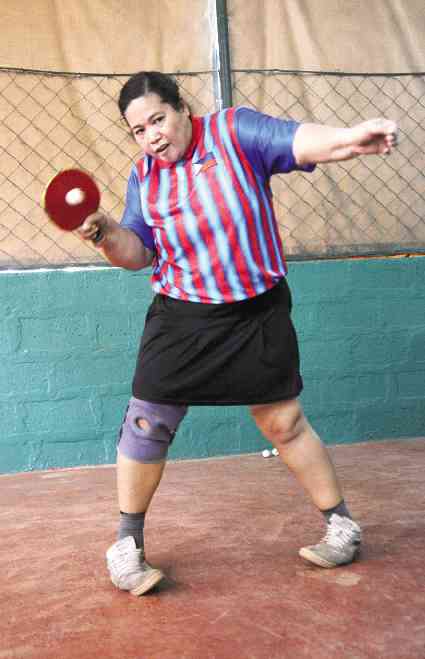As the country’s lone medalist in the 2016 Rio Paralympics, Josephine Medina could have been just relishing the rewards of her biggest sporting success.
Yet the veteran table tennis player is now mired in some sort of infighting in her sport that, thankfully, looks headed for a resolution.
“It’s quite sad that [many people] only see the winning moment,” says Medina. “People should know what athletes have to go through [to get to that].”
Although there’s discomfort in her moment of glory, the 46-year-old tablenetter doesn’t mind. After all, she had gone through many rough patches in life.
Afflicted with polio at eight months old—which resulted to severe limb muscle weakness and leg-length discrepancy— Medina got used to taunts thrown her way. But she had also learned to brush them off.
“I got to overcome all that because of the way my parents raised me,” shares Medina. “When I was young, they explained to me everything—that I may be different from the others, but I can live like a normal person. Never mind [the insults]. As long as you don’t step on someone’s toes, just go on.”
So when she made a mark on the Olympic stage for the differently abled athletes, she also made sure that no one gets stepped on. By plucking a bronze medal in the table tennis women’s singles Class 8—the country’s first Paralympic medal since powerlifter Adeline Dumapong-Ancheta copped a bronze in the 2000 Sydney Games—Medina received a P1-million cash incentive from the government.
As mandated by law, the coach also gets a separate reward, equivalent to half the amount the winning athlete receives. That’s when things got tricky as Medina had been vocal about her “self-training” since the Paralympic qualifiers.
While she appreciates the “accompany coach” designated by her national sports association (NSA) in Rio de Janeiro, she believes that her training partner, Pablo Catalan Jr., deserves the cash bonus more for going through the gruelling, daily practice in her buildup to the Paralympics.
“I always go for righteousness,” says Medina. “Whatever happens, I go for righteousness.”
The native of Albay had differences with a former coach and opted to develop her own program and train with Catalan, a national team member who won a gold with her in the mixed doubles of the 2011 Asean Para Games in Indonesia.
“It’s an issue of incentive,” says Medina. “It’s the coach who will get the incentive, but under the law, it’s up to the athlete to justify who’s the one who rendered service. I’m thankful for my accompany coach, for the 10 days of warm-up training [in Rio]. But we know who really helped me. So I’m fighting for it. We’re settling it with our NSA.”
Medina has always been a fighter but never the belligerent kind. Even when she was growing up, kids laughed at her and mimicked her limp, taunting her as “pilay” (crippled).
“It’s important to have a high emotional quotient,” she says. “You have to be strong. If you let yourself get affected, you lose.”
Medina, apparently, doesn’t get easily ruffled by problems. So, typical local sports issues like the lack of budget for training and competition haven’t slowed her down. In some instances, she just finds a way to resolve things herself, like using her personal funds for a tournament entry fee, airfare or equipment. On occasions, some kind-hearted officials also help her cause.
“I really love table tennis, I play for passion,” she says. “I don’t let obstacles and trials hamper my game.”
As tough as she may be, family softens her. So in 2004, it was a big blow when her father passed away without getting a glimpse of her international forays.
“My only regret is I never had the chance to tell him personally about my experiences,” says Medina. “My father never expected me to play internationally.”
Roberto Medina, a former national table tennis team player and mentor, died of heart attack in Saudi Arabia, where he worked as coach of the Royal Saudi Air Force team. He introduced Medina to the sport as a form of therapy.
“When I was in elementary, Papa used to bring me to his games,” she recalls. “I didn’t like it, it was too public. Of course, he had a purpose. He introduced me to table tennis, but at the same time, he wanted me to overcome my inferiority complex, to become a strong person—that even if you’re disabled, you can still face the world.”
The table tennis therapy turned into a means to alleviate her family’s financial strains. Her varsity stint got her through college at Polytechnic University of the Philippines in Manila, where she graduated with an industrial psychology degree in 1991.
Medina eventually tried out for the regular national team, but got turned down due to her disability. “The rejection turned into something positive for me,” says Medina. “It pushed me to work harder, train harder.”
She continued to play even as she took on part-time office jobs for several years, before getting a call-up for the national para team.
“I didn’t have second thoughts, I said yes,” she says.
After turning into a bemedalled player in the Asean Para Games, Medina got her first shot at the Paralympics in the 2012 London Games, where she finished a heart-breaking fourth following a defeat in the medal match.
When she qualified for the 2016 Rio Games—where she was chosen to reprise the role as country’s flag bearer in the opening ceremonies—Medina felt unsure.
“I wasn’t confident because I felt my training wasn’t enough and I had no coach who focused on me,” she says. “Other athletes have coaches, they have everything—a nutritionist, a physical conditioning coach, a sports psychologist. I didn’t have all that. I had a program because my father used to be a national coach and I followed it.”
After dropping her opening match against Mao Jingdian—the 21-year-old Chinese who eventually defended her title—Medina hardly gained attention until she climbed back to the bronze-medal match where she stunned Germany’s Julianne Wolf.
“On the side I was thinking, ‘Did I win?’” recalls Medina after she scored an 11-5, 11-6, 11-7 upset of Wolf, a silver medallist in the 2015 European Para Championships. “It didn’t sink in until the umpire stood up and congratulated me.
“After winning, the first thing I did was pray to the Lord and thank Him. My sister, she was the one who called and congratulated me.”
Whisked to the medal ceremony briefing, organizers asked her to change into a track suit. She had none.
“I explained to them that I didn’t expect to win,” says Medina. “I only had a jacket and they said it was okay. In the ceremony, that’s when I turned very emotional. All the players, movement-wise, they’re really good. It was really a miracle that I won.”
The surprise medal performance definitely made her happy. But she wants people to see beyond that.
“I want this win to be an eye-opener,” says Medina. “I hope PWD (person with disability) athletes get enough attention. We really train hard, all heart.”



